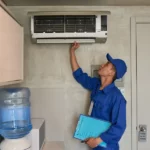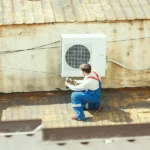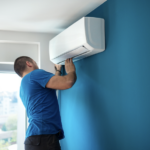Is your HVAC blowing cold air in winter instead of the cozy warmth you need? There are only a few things worse than that!
Still, there’s no need to fret! In this article, we’ll dish out 10 tips that will help you tackle this issue promptly and effectively. Buckle up and let’s dive in!
Why is Your HVAC Blowing Cold Air in Winter
Before we dive into the tips, let’s take a look at what’s causing your HVAC unit to blow cold air instead of warm air. If you ever find your HVAC blowing cold air in winter, it’s probably due to the following reasons:
Incorrect Thermostat Settings
One of the simplest explanations is that your thermostat is not set correctly. Ensure that it’s in “heat” mode and set to the desired temperature. Sometimes, a simple adjustment can solve the problem.
Clogged Air Filters
Dirty or clogged air filters can obstruct airflow, causing your HVAC system to struggle to deliver warm air. Regularly changing or cleaning your filters is essential to maintain proper airflow and heating.
Pilot Light Issues
If you have a gas furnace, a malfunctioning pilot light can be the culprit. A pilot light that’s out or flickering may prevent the furnace from producing heat. Follow your HVAC system’s instructions to relight it or seek professional assistance.
Thermostat Placement
The location of your thermostat matters. If it’s placed near drafty windows or doors, it may sense colder temperatures and trigger the HVAC to blow cold air unnecessarily. Relocate your thermostat to a more central and stable position for accurate temperature readings.
10 Tips to Fix Your HVAC if It’s Blowing Cold Air in Winter
So now that you know why your HVAC is blowing cold air instead of warm air, let’s proceed with the tips.
Check Your Thermostat
Begin by optimizing your settings. Ensure that the thermostat is set to “heat” mode and the temperature is higher than the current room temperature. Sometimes, a simple adjustment can do the trick.
Inspect Your Air Filters
Clogged air filters can restrict airflow and hinder your HVAC’s performance. Take a moment to check your filters. If they’re dirty, replace them. It’s a quick fix that can make a big difference.
Clear the Vents
Ensure that all your vents are open and unobstructed. Blocked vents can disrupt the flow of warm air into your rooms. Keeping them clear ensures even heating throughout your home.
Examine Your Pilot Light
If you have a gas furnace, inspect the pilot light. If it’s out, follow your HVAC system’s instructions to relight it. A steady pilot light is crucial for proper heating.
Check for Leaky Ducts
Leaky ducts can lead to heat loss, making your HVAC less efficient. If you suspect leaks, consider hiring a professional to seal them. It can improve your system’s performance and save you money in the long run.
Invest in a Programmable Thermostat
A programmable thermostat allows you to set specific temperatures for different times of the day. This helps you optimize your HVAC system’s efficiency and save on energy costs.
Schedule Regular Maintenance
Sometimes, it’s better to schedule regular HVAC tune-ups before winter sets in instead of waiting for a problem to arise. A professional can identify and address issues before they become major problems, ensuring your system runs smoothly throughout the winter.
Check Your Insulation
Proper insulation is essential to retain heat in your home. Inspect doors and windows for drafts, and consider adding insulation where needed. This will reduce the workload on your HVAC system.
Upgrade Your HVAC System
If your HVAC system is outdated, it may be time for an upgrade. Newer models are more energy-efficient and can provide better heating performance, ultimately saving you money on your energy bills.
Seek Professional Help
If all else fails, don’t hesitate to call a professional HVAC technician. They have the knowledge and tools to diagnose and repair complex issues with your system, ensuring your home stays warm and comfortable.
Frequently Asked Questions
Why is my HVAC blowing cold air when the heat is on?
Your HVAC might blow cold air when the heat is on due to a thermostat setting issue, clogged air filters, or a malfunctioning pilot light. Checking these things can often help fix the problem.
Should HVAC be on in winter?
It’s a good idea to have your HVAC on in winter to maintain a comfortable temperature in your home. However, you should set it to a reasonable temperature to save energy and avoid overheating.
How long should my HVAC fan run in winter?
In winter, your HVAC fan should run for about 20 to 30 minutes after the heat turns off to distribute the remaining warm air throughout your home. This helps maintain a consistent temperature.
Is it OK to run my HVAC fan continuously?
Running your HVAC fan continuously can be okay for air circulation, but it may increase energy costs. It’s generally better to use the “auto” setting, which runs the fan only when heating or cooling is active, and switch to continuous fan mode sparingly when needed.
Get Your HVAC Blowing Warm Air Again
As you can see, there’s no need to worry if your HVAC is blowing cold air in winter. By knowing the main cause and following the 10 tips above, you can troubleshoot and address the issue effectively. And if all else fails, you can always call your trusted HVAC professional.






